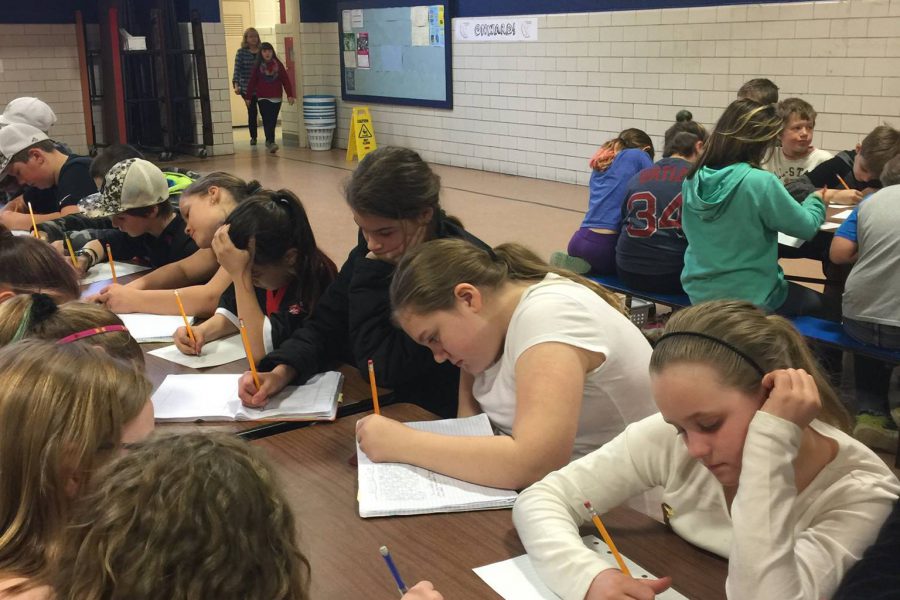
Whenever I’ve dealt with something difficult in my life, I’ve turned to writing. Writing helps me process, work through challenges, and make sense of my emotions. It also helps me express myself to others. Sometimes the writing turns into something I share with the public; sometimes it never sees the light of day outside of my journal. But that kind of writing has its place, too. Not everything students write needs to become something they share. There are benefits to writing, even in a journal that never gets shared. Free writes give students the opportunity to process what’s on their minds and practice formulating and communicating their ideas. Writing can also be a powerful tool to deal with trauma. In her article titled “Reading, Writing, And Traumatic Stress: Helping Kids Cope During The School Year,” Chandra White-Cummings writes,“The freedom and outlet for self-expression is vital to helping young people process traumatic life events.”
Many of the low-income, at-risk, and rural kids CLiF serves have experienced trauma and even multiple Adverse Childhood Experiences (ACEs). These early experiences often hinder students from learning and reaching their full potential. It can be difficult to focus on schoolwork and retain information when you’re dealing with challenges at home. We inspire these kids to love reading and writing because these are some of the strongest tools we have to express our own experiences and learn about others’. Both “mirrors” and “windows”—that is, books that reflect one’s own experiences and ones that reveal experiences different from your own—can help children become more empathetic and connect to others.
Reading can be an equally important part of the healing process. Reading about others’ struggles with issues similar to yours can be validating and help you feel less alone. CLiF presenter Ann Braden writes about poverty and abusive relationships in her middle grade book, The Benefits of Being an Octopus, which was named an NPR “Best Book of 2018”. The protagonist, Zoey, strives to be like an octopus, which are resilient and able to adapt to their environment. Braden has been met with enthusiastic reactions from young readers who have remarked that Zoey and her challenges are just like what they deal with in their own lives. Braden says, “I heard about an 11-year girl who said, ‘I didn’t know anyone wrote books about people like me.’” Seeing themselves reflected in books can be an important part of a child handling trauma and adverse situations.
The American Psychological Association says, “Writing’s power to heal lies not in pen and paper, but in the mind of the writer, say a number of psychologists who use it with their patients.” They also warn that simply writing about emotions without reflection can bring up negative feelings, so teachers or mentors working with students who have endured trauma should be aware of some of the baggage the writing process can bring up. When guided and used as a tool for reflection, writing can help heal those wounds. It can even have health benefits such as reduced stress and improved cognitive function.
In her article, “Releasing the Mind of Childhood Trauma Through Writing,” educator Tiana Silvas writes,“One way I have supported students is by developing a sensitive and supportive writing workshop in which students can utilize writing as a coping tool.” Her writing workshops emphasize trust and lack of judgement. They also offer choice for the young writer to explore their emotions in the ways that work for them. Silvas says, “Students should never be pushed to write about their trauma. To honor privacy and trust, the student must initiate this step.”
Writing—and reading—can be useful ways to help students deal with stress and challenges in their lives.
Erika Nichols-Frazer is a writer and CLiF’s Communications Manager. Her work has been published or is forthcoming in HuffPost, OC87 Recovery Diaries, Please Do Not Remove: A Collection Celebrating Vermont Literature and Libraries, and elsewhere. You can find her at nicholsfrazer.com.




Teachers are not trained therapists. The role of a language arts teacher is not to remind children of childhood trauma, which if done, could trigger more trauma. So without further research to ensure teachers aren’t triggering harm, teachers should be very careful about what they assign students to read and write about. When in doubt, stay away from the topic.
I grew up in an abusive home. Reading is what saved me. The idea is to encourage reading because it can model what normal looks like and allows the body to relax giving it a rest from a constant infusion of cortisol. Teachers aren’t therapist but they can support a student in reading g which is a tool for healing.
I was sent away when I was a kid to stay in my uncle’s house. I suffered tremedously over there and my parents always refused to discuss it . My parents are oldstyle and the idea of expressing myself was foreign to them. They were not aware that if a child goes though a traumatic event it has to be processed again. They just expected me to be a normal child again.
Dovid, I’m so sorry you had to go through that. Unfortunately, too many children have to deal with situations like that. The healing process is so important and I believe that reading and writing can be a powerful tool for that.